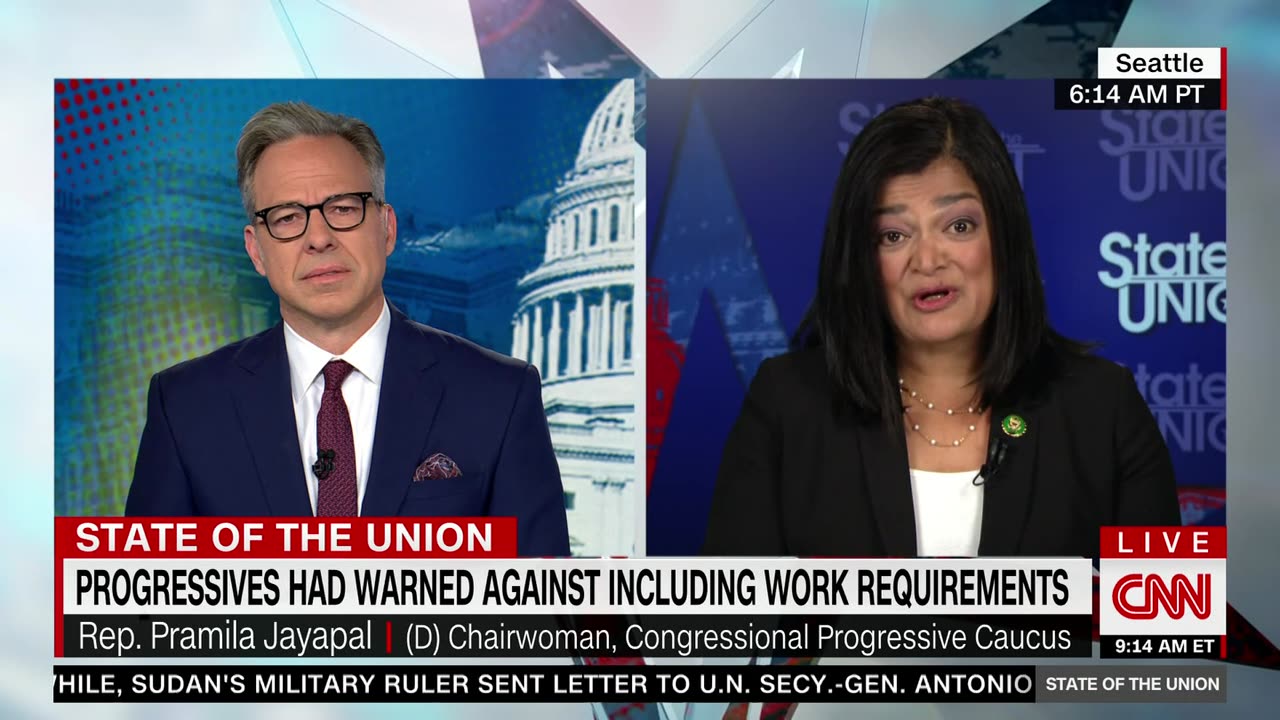Premium Only Content

Jayapal: That is exactly the problem. When the media reports this as not their fault
Now progressives are putting debt ceiling negotiations in jeopardy as they push back on some of what President Joe Biden agreed to in the deal struck with Speaker Kevin McCarthy.
Democratic Rep. Pramila Jayapal of Washington said she 'isn't happy' with some of the things she is hearing are included in the bill.
She told CNN on Sunday morning that Democratic leadership 'should worry' about progressives supporting the bill.
Meanwhile, McCarthy claimed Sunday that despite the deal, there is 'nothing in the bill' that Democrats could call a win.
'I haven't seen the text,' Jayapal told State of the Union host Jake Tapper on Sunday. 'We're all trying to wade through spin right now.'
She added: 'I'm not happy with some of the things I'm hearing about, but they are not cutting the deficit and spending.'
The GOP held a members call at 9:30pm after McCarthy and Biden spoke on the phone earlier in the night for about an hour-and-a-half.
With the outlines of a deal in place, the legislative package could be drafted and shared with lawmakers in time for votes early next week in the House and later in the Senate.
McCarthy said once a deal is reached, he will give legislators 72 hours before bringing the bill to a vote. He noted that the bill would not be lengthy, likely around 150 pages.
The dreaded June 5 deadline is four days later than a previous X-date, but still guarantees that - even with a deal this weekend - it will be a frantic race to get a bill through Congress in less than 10 days.
Some top House Republicans have also signaled disapproval of the deal McCarthy struck with the Democratic president.
Biden and McCarthy reached a deal 'in principle' late Saturday to end a months-long stalemate and raise the federal government's $31.4 trillion debt ceiling. McCarthy said he and others were working through the night to complete the language of the proposal.
'There's not one thing in the bill for Democrats,' McCarthy told Fox News Sunday, despite Biden wanting a debt limit hike through 2024 – and getting that.
Some things Jayapal doesn't like in the bill are the stricter work requirements to obtain food assistance, and said it's 'really unfortunate the president opened the door' for that provision in the first place.
'Perhaps because of the exemptions it really will be ok, that I don't know,' she said, insisting she needs to see the full text of the bill.
McCarthy emerged from a call with Republicans late Saturday night to say that he will speak again with the president after his granddaughter's graduation on Sunday. He added that he would work through the night to complete the language of the bill.
Rep. Bob Good, a member of the conservative and powerful House Freedom Caucus, expressed objections to the deal during the Saturday evening call with Republicans.
Freedom Caucus Chairman Scott Perry also raised concern on that call, noting he is disappointed that Republicans are agreeing to raise the debt limit by more than the U.S. would save.
Republican Main Street Caucus head Dusty Johnson told NBC's Meet the Press on Sunday morning that most 'pragmatic' conservatives are not against the deal.
'When you're saying conservatives have concerns, it is really the most colorful conservatives,' the South Dakota congressman said.
Johnson added: 'Overwhelmingly, Republicans in this conference are going to support the deal. How could they not? It is a fantastic deal.'
The reports of pushback from within McCarthy's party further proves that the GOP is not on the same page and exhibits the fractions within the majority in the House – especially between the more conservative members.
Rep. Jim Jordan, the Judiciary chairman and former Freedom Caucus leader, sounded more upbeat about the deal on the Saturday call.
McCarthy continued to downplay some anger within the Republican Conference on Sunday morning, telling Fox that 'more than 95 percent' of House Republicans are 'very excited' about the debt limit deal.
The deal would avert an economically destabilizing default, so long as they succeed in passing it through the narrowly divided Congress before the Treasury Department runs short of money to cover all its obligations.
The Treasury warned on Friday that this would occur if the debt ceiling is not raised by June 5.
Speaker McCarthy came out of negotiations to address the press on Saturday night at 9:15 pm.
'We have reached agreement in principle - a deal worthy of the American people to lift people out of poverty with no new taxes or government overreach programs,' McCarthy explained.
'I expect to finish the writing of the bill and then post the text of it tomorrow for it to be voted upon on Wednesday,' he said without taking any questions from reporters.
'Big, thorny issues remain,' one of the top negotiators, Rep. Patrick McHenry, R-N.C., told reporters in the evening. Some of those outstanding issues, McHenry said then, 'the president and speaker have to resolve at that level.'
President Biden also released a statement late on Saturday night.
'Earlier this evening, Speaker McCarthy and I reached a budget agreement in principle. It is an important step forward that reduces spending while protecting critical programs for working people and growing the economy for everyone.
'And, the agreement protects my and Congressional Democrats' key priorities and legislative accomplishments,' Biden said.
'The agreement represents a compromise, which means not everyone gets what they want. That's the responsibility of governing. And, this agreement is good news for the American people, because it prevents what could have been a catastrophic default and would have led to an economic recession, retirement accounts devastated, and millions of jobs lost.
'Over the next day, our negotiating teams will finalize legislative text and the agreement will go to the United States House and Senate. I strongly urge both chambers to pass the agreement right away,' the president said.
Despite the deal, McCarthy isn't backing off his attacks at Biden.
'I just got off the phone with the president a bit ago,' he tweeted Sunday evening. 'After he wasted time and refused to negotiate for months, we've come to an agreement in principle that is worthy of the American people.'
Republicans who control the House have pushed for steep cuts to spending and other conditions, including new work requirements on some benefit programs for low-income Americans and for funds to be stripped from the Internal Revenue Service (IRS).
Republicans said they want to slow the growth of the U.S. debt, which is now roughly equal to the annual output of the country's economy.
Exact details of the final deal were not immediately available, but negotiators have agreed to cap non-defense discretionary spending at 2023 levels for two years, in exchange for a debt ceiling increase over a similar period.
The two sides have to carefully thread the needle in finding a compromise that can clear the House, with a 222-213 Republican majority, and Senate, with a 51-49 Democratic majority.
Their new discussion Saturday by phone came after Treasury Secretary Janet Yellen told Congress that the United States could default on its debt obligations by June 5 - four days later than previously estimated - if lawmakers do not act in time to raise the federal debt ceiling.
Economists have spent months raising the prospect of economic catastrophe should the government default, but both the White House and Republican leadership insist they are negotiating in good faith and are confident a deal will be reached in time.
The debt ceiling raise is an annual accounting maneuver that usually passes with little notice. It simply allows the government to keep borrowing money to pay for bills already incurred through the budget.
This year, the increasingly hard-right Republican Party has decided to turn the debt ceiling into leverage to force Biden to roll back favorite Democratic spending priorities.
The extended 'X-date' gives the two sides a bit of extra time as they scramble for a deal. But as another day dragged on with financial disaster looming closer, it had appeared some of the problems over policy issues that dogged talks all week remained unresolved.
Both sides said one of the main holdups was a GOP effort to expand existing work requirements for recipients of food stamps and other federal aid programs, a longtime Republican goal that Democrats have strenuously opposed.
The White House said the Republican proposals were 'cruel and senseless.'
There was also some laboring over a compromise on federal permit changes that would ease regulations for developing oil, gas and renewable energy projects and foster new transmission line connections.
The long standoff spooked financial markets, weighing on stocks and forcing the United States to pay record-high interest rates in some bond sales.
A default would take a far heavier toll, economists say, likely pushing the nation into recession, shaking the world economy and leading to a spike in unemployment.
Failure to lift the borrowing limit, now $31 trillion, to pay the nation's incurred bills, would send shockwaves through the U.S. and global economy.
Yellen said failure to act by the new date would 'cause severe hardship to American families, harm our global leadership position and raise questions about our ability to defend our national security interests.'
Anxious retirees and others were already making contingency plans for missed checks, with the next Social Security payments due next week.
Biden for months refused to negotiate with McCarthy over future spending cuts, demanding that lawmakers first pass a 'clean' debt-ceiling increase free of other conditions, and present a 2024 budget proposal to counter his issued in March. Two-way negotiations between Biden and McCarthy began in earnest on May 16.
Democrats accused Republicans of playing a dangerous game of brinksmanship with the economy. Republicans say recent increased government spending is fueling the growth of the U.S. debt, which is now roughly equal to the annual output of the economy.
The last time the nation got this close to default was in 2011, when Washington also had a Democratic president and Senate and a Republican-led House.
Congress eventually averted default, but the economy endured heavy shocks, including the first-ever downgrade of the United States' top-tier credit rating and a major stock sell-off.
This time around, House Speaker McCarthy had strengthened his hand by overseeing passage of an April bill that paired $4.8 trillion in spending cuts with a $1.5 trillion debt-ceiling hike.
The bill had no chance of passing the Democrat-controlled Senate, but showed that McCarthy had the ability to hold together his thin majority just four months into his top leadership role.
Biden and McCarthy had seemed to be narrowing on a two-year budget-cutting deal that would also extend the debt limit into 2025 past the next presidential election.
The contours of the deal have been taking shape to cut spending for 2024 and impose a 1% cap on spending growth for 2025.
The Republican proposal on work requirements would save $11 billion over 10 years by raising the maximum age for existing standards that require able-bodied adults who do not live with dependents to work or attend training programs.
Current law applies those standards to recipients under the age of 50. The GOP plan would raise the age to include adults 55 and under. It would lower the number of exemptions that states can grant to some recipients subject to those requirements.
Biden has said the work requirements for Medicaid would be a nonstarter. He initially seemed potentially open to negotiating minor changes on food stamps, now known as the Supplemental Nutrition Assistance Program, or SNAP, but his position has appeared to harden.
-
 LIVE
LIVE
Pepkilla
3 hours agoSundayzZzZzZz Wins?
165 watching -
 LIVE
LIVE
Mossy
2 hours ago🍃PRE HALO PARTY🍃OBLIVION HARDEST DIFFICULTY🍃COME CHILL🍃420 SESH🍃GAMING🍃REACTIONS🍃MORE????🍃
50 watching -
 18:15
18:15
World2Briggs
11 hours ago $15.80 earned10 Cities That Are Slowly Emptying Like a Sad Party
46.4K30 -
 11:34
11:34
Mrgunsngear
21 hours ago $8.50 earnedSiege Suppressors ROC556 Low Backpressure Silencer Review 🤫
33K5 -
 30:57
30:57
Clownfish TV
8 hours agoDisney Drops DEI and Goes PRO-AMERICA?!
43.5K44 -
 17:35
17:35
QNewsPatriot
21 hours ago(4/25/2025) | AUDIO CHAT 166 | SG Sits Down w/ Sovereign Radio Founder Scotty Saks: Vaxx Lawsuits and the #NeverAgain Telethon
46.7K17 -
 19:51
19:51
CatfishedOnline
5 hours agoSpouse Sends $50,000 To A Man Who Doesn't Exist 😱
29.4K3 -
 11:59
11:59
ariellescarcella
21 hours agoThe Dark Side Of "Queer Joy"
23.6K22 -
 1:12:39
1:12:39
Squaring The Circle, A Randall Carlson Podcast
1 day ago#045 What Are The Structures Beneath The Great Pyramids in Giza? Squaring the Circle: A Randall Carlson Podcast
32.6K7 -
 2:08:05
2:08:05
Badlands Media
1 day agoDevolution Power Hour Ep. 349: Trump’s Geopolitical Gambits, Sports Psyops, and the Regime’s Unraveling
144K110